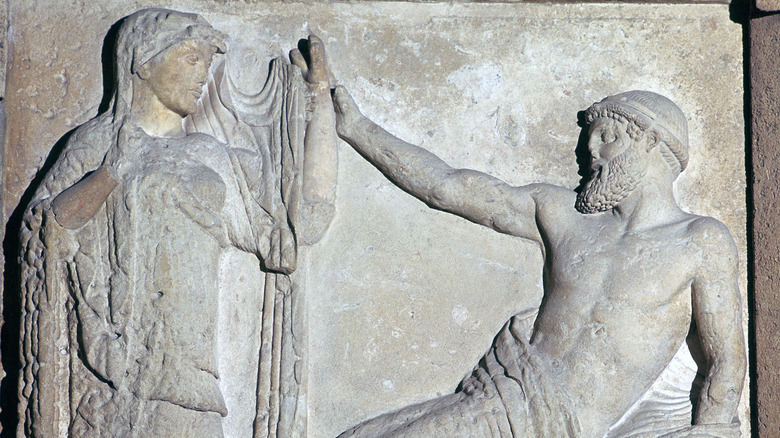The Myth Of Lamia Explained
In Greek mythology, Lamia was a demon who devoured children (via Britannica). But her story is more sympathetic than it sounds by that description. In classical mythology, a demon — also spelled daemon or daimon — was a term used by Homer to essentially mean the same thing as "god," according to Britannica, and later it meant a spirit that influenced a person, for good or evil.
Lamia was wicked, but she wasn't always that way. She was once a beautiful Libyan queen, loved by Zeus — and resented by Zeus's jealous wife, Hera, according to Greek Mythology. There are frequent stories of Hera inflicting punishments on Zeus' lovers — turning them into bears or tricking them into self-immolating (via Greek Mythology). But the punishment she gave Lamia was possibly her cruelest. Hera cursed Lamia so that any time she gave birth, her child would quickly die. In one iteration of this story, the curse was that Lamia would kill them herself (via Greek Gods and Goddesses). The curse made Lamia mad with grief. She never slept — and gradually, she turned into a monster.
The Ancient Greek boogeyman
Lamia began kidnapping babies from unsuspecting mothers and bringing them back to a cave — her lair — to cannibalize (via Greek Mythology). Her face transformed into a hideous beast. Day and night, without rest, she found children to kill and eat.
To stop her from consuming every baby in Greece, Zeus finally severed her eyes from her sockets. Since then, it's said, she must keep her eyes in a jar during the day, keeping her from hunting. It's only at night that she can pop them back in and look for babies to feast on. Naturally, this tale became something of a boogeyman story for young children in the Classical world.
As the tale evolved, Lamia became more like a vampire or a succubus, a woman who seduced men only to consume them as they slept. In this version, there might be a tribe of these terrifying creatures, pluralized as the Lamiai (via Theoi).

